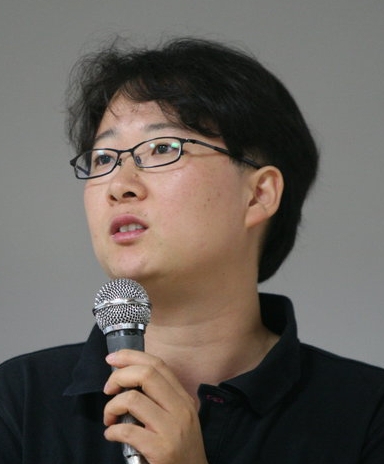Most Popular
-
1
Qoo10 liquidity crisis sparks massive complaints, fears of wider damage

-
2
Yoon urges municipalities to embrace foreigners

-
3
What is happening at Hybe?

-
4
Korea unveils tax reform bill to spur economy

-
5
S. Korea to consent to Japan's Sado mines gaining World Heritage status: official

-
6
Actor’s excessive airport security sparks probe into human rights violations

-
7
Crowded public transport, long commutes top stressors for Seoul, Gyeonggi workers: survey

-
8
Man who let his father die due to financial difficulties to be released on parole

-
9
Actor Yoo Ah-in accused of sexual attack

-
10
S. Korea, China shifting from tensions to cooperation: Seoul

-
Should the abortion law be liberalized?
With the current statute largely ignored ...A common practice outside the lawAbortion in South Korea is illegal in most circumstances, with only a limited number of exceptions listed under 1973’s Maternal and Child Health and the Mother and Fatherless Child Health Acts. An abortion may legally be performed if either parent has a eugenic, hereditary or communicable disease; the pregnancy is the res
July 27, 2011
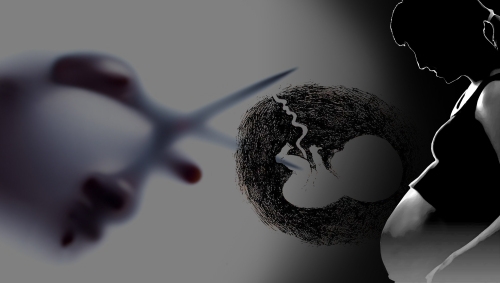
-
Readers’ VOICE
On English lectures ...Korean students have studied English very hard at school, educational institutes and even gone abroad to study the language. We have invested enormous time and money in English.Though the situation is such, when a foreigner asks us something, why are we embarrassed?When we are faced with English, why do we feel repulsion about it first?There are many reasons for this but I t
July 20, 2011
-
Should a law ban sexualizing of K-pop teens?
Following the FTC’s guidelines to protect young entertainers ... K-pop groups with underage members such as KARA have caused controversy with their provocative dress and dance routinesDrawing a line between sex and popOver the last 15 years, K-pop has grown from being entertainment for Koreans to being the subject of affection of fans across Asia, North America and Europe. Concerns over the incre
July 20, 2011

-
Readers’ VOICE
On English lectures...I think the English lecture debate in Korea has two sides, which is good because it is an exciting moment to share ideas among students in English. However, it is true that it also has limitations.This semester, I took two lectures in English. One I took was about Korean theater. We were taught how Korean theatre has developed with shamanism. I think it would have been better
July 13, 2011
-
Should Korean colleges teach in English?
With Korea part of an ever more globalized world...Balancing globalization and reality in the lecture hallLectures conducted in English have become commonplace at Korean universities in the last few years. It has been reported that universities in Seoul conduct between 20 and 40 percent of their lectures in English. A desire to keep in step with globalization and bump up Korean universities’ place
July 13, 2011
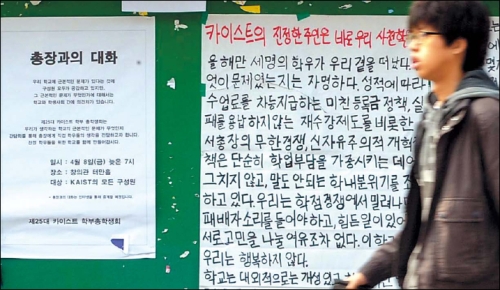
-
Readers’ Voice
North Korean dictators are enjoying their luxurious lives through seizing the aid provided to help those on the streets.Even though the South knows that not all the food will reach those in need, South Korea keeps sending food.Just because North Korea is a brother nation does not give them the right to starve the poor. The South should realize the truth and find a better way to help civilians rath
July 6, 2011
-
Readers’ VOICE
On food aid...Food is a basic human need with water, shelter, education and primary health care. It is a prerequisite for health -- the most important component of human resource development. Food security is now listed among the social determinants of health which is clearly a determinant of HRD - life, dignity, civil society, progress, justice and sustainable development. As an awakened academic
July 6, 2011
-
Should food aid to N.K. be resumed?
Divisions over aidEver since President Lee Myung-bak suspended food aid to North Korea upon taking office in 2008, the question of its resumption has been highly contentious. Lee ended the shipments of rice that had taken place under his liberal predecessors with the insistence that aid be tied to denuclearization by the North. The sinking of the Cheonan last March and the attack on Yeonpyeong isl
July 6, 2011
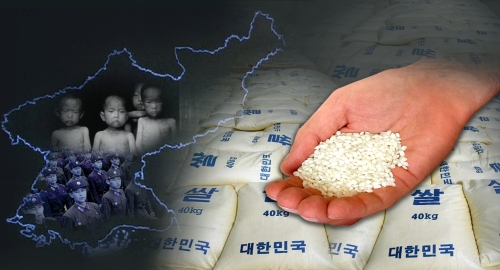
-
Should Korea legalize prostitution?
With the industry strong despite police crackdowns ...Should Korea legalize prostitution?The sex trade in KoreaDespite its illegality, the prostitution industry in South Korea is widespread and lucrative. Estimates vary wildly, but approximately 1.6 percent of the country’s GDP was generated by the sex industry in 2007, according to Korea Women’s Development Institute. Before two laws were passed
June 29, 2011
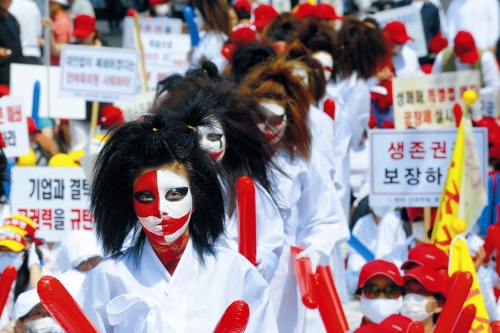
-
Is indirect corporal punishment right?
With teachers banned from striking their students...Is indirect corporal punishment right?Punishment in the classroomIndirect corporal punishment, such as push-ups, squats and laps, is permitted in elementary, middle and high schools under a law revised in March. The revision came after the Ministry of Education banned traditional corporal punishment. It is a compromise measure between traditional
June 22, 2011
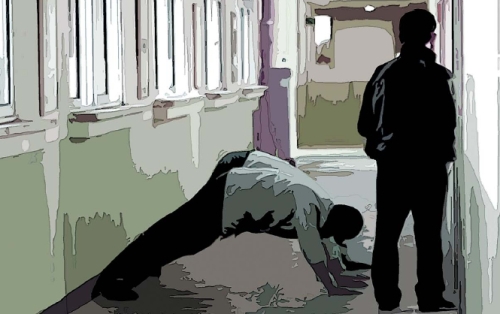
-
Readers' Voice
On indirect corporal punishment...The role of schools in society is to give children knowledge and to prepare them to succeed in adult life. Indirect corporal punishment teaches children that their choices have consequences, just like in the real world. It also helps maintain class discipline, which is essential to creating an environment where learning can flourish. As long as it is carried out r
June 22, 2011
-
Reader's Voice
On fee-cut plan ...The plan itself is a really good plan. It’s been four years already with the GNP, however, there hasn’t been any change in college fees. GNP’s college tuition cut plan was one of the biggest commitments of the party. College students voted for the GNP four years ago because they thought the tuition-cut plan was hope for them. There is one more year before Korea gets a new presid
June 15, 2011
-
Should government pay half for college?
As students take to the streets for cheaper university tuition ...Should government pay half for college?College fees in South KoreaIn recent days thousands of students have been taking to the streets to demand lower college fees, spurred on by recent pledges by both the Grand National Party and Democratic Party to cut the price of tuition.Student protests against rising fees are a common occurren
June 15, 2011
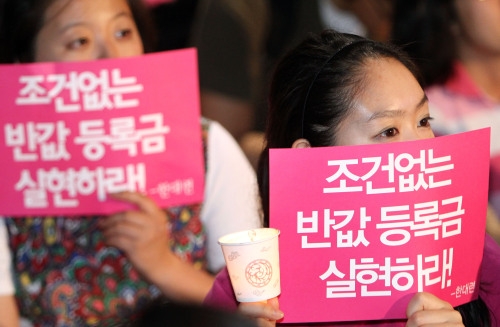
-
Readers’ voice
On the death penalty...China, India, the U.S., Japan and several other major countries still use the death penalty. Especially when you consider that technically Korea is still in a state of war, and does suffer the threat of attack, assassinations or sabotage from North Korean agents, I believe the death penalty is an appropriate deterrent/punishment to consider. Korea’s death penalty seems quite
June 8, 2011
-
Should Korea end the death penalty?
With a growing abolitionist trend worldwide and 14 years execution-free...Should Korea end the death penalty?Somali pirates on trial last month after hijacking a South Korean freighter earlier in the year. Prosecutors unsuccessfully sought the death penalty for one pirate for the attempted murder of the ship’s captain. (Yonhap News)Capital punishment in S. KoreaThe recent trial of four Somali pira
June 8, 2011
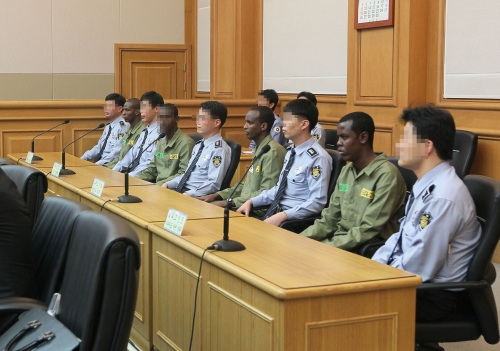
-
Readers’ voice
On nuclear energy...The environmental consequences and sheer capital intensiveness of nuclear power seals the deal on it being a complete loser as far as supplying our energy needs. We can’t replace oil, but we can use existing infrastructure and combine sludge from water treatment plants with other waste from agriculture and the food industry which otherwise are disposed of separately at great ex
June 8, 2011
-
Should Korea scrap nuclear energy?
After the Fukushima disaster and Germany’s decision to shut down its reactors ...Should Korea scrap nuclear energy?Yes: It is too dangerous for us to controlThe “nuclear renaissance” is still booming in Korea even after Japan’s Fukushima nuclear accident. Tokyo Electric (TEPCO) still seems unable to control its reactors with much more radioactivity still held inside the Fukushima nuclear power pla
June 1, 2011
